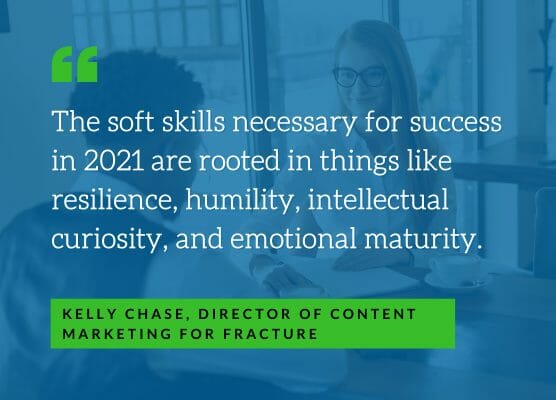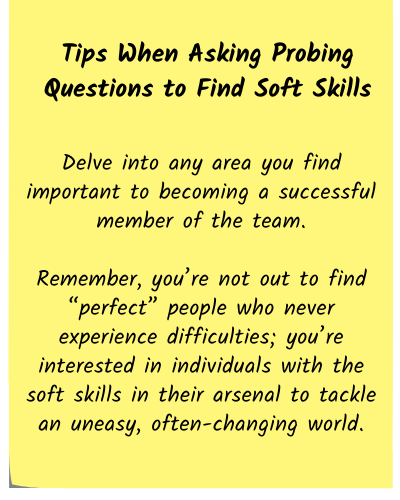4 ways hiring managers can assess a candidate’s soft skills
 Hiring in 2021 is about more than evaluating applicants for hard skills, it’s vital to assess a candidate’s soft skills also. Educational attainment and specific knowledge still play a role when deciding which person to bring aboard. However, the COVID-19 pandemic has elevated the importance of abilities such as flexibility, resiliency, and self-monitoring. Similarly, recent social movements have highlighted the need to find employees who can work well in heterogeneous groups and who share the company’s commitment to equality.
Hiring in 2021 is about more than evaluating applicants for hard skills, it’s vital to assess a candidate’s soft skills also. Educational attainment and specific knowledge still play a role when deciding which person to bring aboard. However, the COVID-19 pandemic has elevated the importance of abilities such as flexibility, resiliency, and self-monitoring. Similarly, recent social movements have highlighted the need to find employees who can work well in heterogeneous groups and who share the company’s commitment to equality.
“Soft skills have always been trickier to evaluate than other info on applicant resumes,” says Jon Hill, CEO and chairman of The Energists. “This is partially because you’re relying mainly on the candidate’s self-assessment rather than a tested or certified skill. An applicant who says they’re adaptable or self-motivated may completely believe that’s true when they put it on the resume, but that doesn’t necessarily mean they meet your company’s standards.”
How, then, might employers go about finding workers who possess the soft skills they seek? Try these four actions.
Pinpoint the most important qualities
Identify the soft skills you wish to assess, ones critical to the company and the position at hand. Then, ask for them in your job postings. You’ll attract applicants who see themselves in your description. You may be seeking a self-starter capable of running a project with minimal supervision or a highly adaptable worker who can quickly shift focus based on the ever-changing current climate.
Many individuals looking for employment come from industries hit hard by the pandemic. These job seekers may lack the technical knowledge needed for your current openings. However, they may possess valuable soft skills that are transferable to your company. Some examples include strong attention to detail, ability to follow instructions, and excellent time management. Advertise for applicants with these relevant qualifications, along with a statement about your willingness to train promising candidates. It may yield a pool of possible talent for hard-to-fill vacancies caused by a skills gap.
Examine the past
When assessing a candidate’s soft skills, start with their cover letter or resume. As previously noted, though, anybody can claim to possess these often-vague traits. Savvy applicants realize this problem and include specific examples to illustrate their competency. They don’t just say they work well independently. Rather, they offer evidence of the situation and its results.
In many cases, you’ll need to read between the lines. Looking for someone comfortable in a remote environment? Scrutinize her resume for potential, such as a history of telecommuting or performing contract work out of a home office.
Numerous employers today put a premium on finding life-long learners. People with a willingness to acquire new knowledge prove valuable as companies expand, technology progresses, and events such as the pandemic necessitate adjustments. Companies experiencing difficulty filling roles due to the skills gap also benefit from detecting individuals likely to be highly trainable.
“One great identifier of someone capable of being taught is to see whether they advanced in previous roles they held. If a person went from an entry-level position onto assistant manager and then manager, for example, you can be confident they were able to learn new skills at each stage of advancement,” says Nerissa Zhang, founder and CEO of The Bright App.
 Ask probing questions
Ask probing questions
Interviews serve as a great time to assess a potential candidate’s soft skills in closer details. While this involves going beyond standards like “tell me about yourself,” the effort will pay off.
“The soft skills necessary for success in 2021 are rooted in things like resilience, humility, intellectual curiosity, and emotional maturity. Ask questions that require the candidate to go a little deeper and talk about times when they have had to leverage those traits to get the job done,” says Kelly Chase, director of content marketing for Fracture.
A sample question Chase suggests is “Tell me about a time that a project that you were working on was not successful. What went wrong, how did you respond, and what would you do differently?”
“Not only will these types of questions give you a better chance to understand how a candidate tackles tough situations, but the way that they answer the questions can give you a lot of insight as well. Anyone can talk about their wins and successes, but it takes a level of humility and emotional maturity to be able to speak about times when things didn’t go your way. A candidate who has the self-awareness to talk about these situations and reflect on what they might have done differently likely has the soft skills that you are looking for,” Chase says.
Questions should get to the heart of the soft skills you’re interested in
Delve into any area you find important to becoming a successful member of the team.
Looking for leaders who share the organization’s commitment to building a tolerant workplace? Ask prospective managers about a challenge they faced and overcame in the past regarding diversity issues.
Want a glimpse into how someone operates in a remote setting? Ask about the obstacles he has faced while working from home and the solutions developed.
Remember, you’re not out to find “perfect” people who never experience difficulties; you’re interested in individuals with the soft skills in their arsenal to tackle an uneasy, often-changing world.
Consider a test run
Finally, look for opportunities in which candidates can demonstrate the soft skills you’re assessing in a real-life setting. Try teaching a promising applicant lacking a hard skill a task or two to see how well he grasps unfamiliar information. Give a potential remote worker a short assignment and see how she delivers.
Hill says he has had success having the candidate participate in a collaboration session or project with his existing team. (This could be done virtually nowadays if unable to gather together for safety reasons.)
“Along with seeing their skills in action, you may see a different side of the candidate when they’re interacting with potential future co-workers instead of a hiring manager. This also lets you bring your existing employees into the hiring process, taking advantage of their insights about the applicant’s skills and fitness for the team,” Hill says.
Or, try hypothetical problem-solving. Present the candidate with a scenario she’ll likely face in the applied-for position and see how she addresses it. You’ll see how someone might react to sudden workplace changes or remain productive in a remote environment. This enables you to hire with greater confidence during what promises to be a challenging year.
Additional Resource: See more on the value of hiring for attitude over skill.






